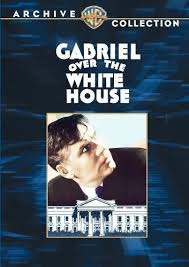
GABRIEL OVER THE WHITE HOUSE
As, 1933, 86 minutes, Black-and-white.
Walter Huston, Karen Morley, Franchot Tone, Dickie Moore, Samuel S.Hinds, Jean Parker.
Directed by Gregory La Cava.
Gabriel over the White House is quite a title.
This is a film released in 1933, the first year of the presidency of Franklin D. Roosevelt, but made before his election. It reflects the anxiety of the Depression with so many unemployed and the challenge for the American government.
In this scenario, a party hack, played by Walter Huston, is elected to toe the party line but not to make any decisions. He is rather carefree, goes for a drive and is involved in an accident and, in hospital, has a strange experience, indicated by white light, of the presence of the Angel Gabriel who transforms him into something of a crusader, much more business-like to his staff, going out to meet the leaders of the protests.
There is a complication with some racketeers who defy the president and assassinate the leader of the protests.
However, the president appoints his young assistant, played by Franchot Tone, to head up an organisation, very militaristic in its attitude and uniforms, to hunt out the racketeers and to try them, in a stylised-looking court, and then to execute them by firing squad. From the perspective of the 21st century, this is rather disturbing.
However, the film was produced by press baron, William Randolph Hearst (later to be the subject of Orson Welles’ Citizen Kane), a powerful man with his media, his yellow press, with presidential ambitions, and sympathy for fascist methods for imposing law and order.
Which means that, despite the disturbance, this is a very interesting film in the light of subsequent American history.
1. The title? Expectations? Americana? Politics? Religion?
2. Gabriel as a symbol from the Jewish Scriptures, the end of days, the messianic age, angel of light? Symbolic images of light?
3. MGM production values, the early 1930s? The cast? Black-and-white style? The musical score?
4. William Randolph Hearst as producer? His ideas, dictatorial, the touch of the fascist, ambitions politically in America? The making of the film? Dramatising his ideas?
5. The US in the 1920s, the depression, 1932-33, the election of 1932? The coming of Roosevelt, the New Deal?
6. Hammond, Walter Huston, the party man, the hack, his election, with his supporters, and his promises, not intending to keep them, settling into comfortable life in the White House? The relationship with Pendy, her coming to work? His friendship with Jimmy, the chat, play and serious? Beck, his political career, adviser, a young man at the White House?
7. The presentation of the people, the mass of the unemployed, the leader, the group, the protests and demonstrations?
8. Hammond, doing nothing, going driving, carefree, the accident, his recuperation, the light, the experience of Gabriel?
9. His becoming a new person, the way he treated people, the use of their names, the strong meetings, opinions, firing people? The confrontation with Congress? Going out to meet the people, the poor, at the protests, his plans?
10. His significance as President, his encounters with people, his speeches, hopes, the economy?
11. The presentation of Diamond, gangster, killer, prison, release, his henchman, involvement in rackets, opposing the President? The contract on the leader of the protest and his death?
12. The background of the story of Al Capone, arrest, charges, taxes? The presentation of the stylised court, the hearing, the condemnation? The visual fascist look of the trial? The presentation of fascist attitudes in the film? The firing squad, Beck, in uniform, in charge of the investigation, the ruthlessness, the military?
13. The parallel with the fascist dictatorships in Europe at the time? Hearst and his admiration?
14. The President, moving in and out of different personalities, the Gabriel vision taking over?
15. The international meeting, the issue of American debts, the representatives from the different nations, the speeches? The visuals of the bombing of the Navy ships? The stirring of the delegates, their signing, a foreshadowing of United Nations meetings?
16. The President, his death, achievement? The attitudes of Pendy, approval, disapproval? Beck? And the romance between the two?
17. The film as a fable, fantasy, with relevance to their political situations of 1933?